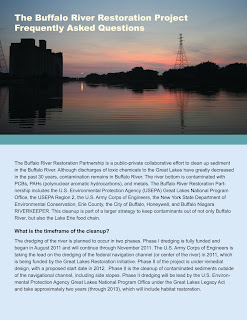The Buffalo River was subjected to a great deal of industrial contamination years ago. Efforts at pollution prevention and cleanup have helped to rehabilitate the water way, but a great deal of contamination still exists in the sediment at the bottom of the river. These contaminants can still have a negative effect on economic, social, and environmental uses of the river, but an ongoing collaboration between a number of agencies is working right now to clean up and restore the river bottom.
The U.S. Environmental Protection Agency, U.S. Army Corps of Engineers, Buffalo Niagara RIVERKEEPER, Honeywell and several other affiliated public and private entities have teamed up to complete a two-year dredging project that will remove 1.2 million cubic yards of contaminated sediment, which will provide a clean and supportive environment for local, native species to flourish.
Part of the work is being performed under the Great Lakes Legacy Act, which revitalizes once-thriving waterways through sediment cleanups and restoration. The act requires at least 35 percent of the project cost to come from non-federal partners. IISG’s Environmental Social Scientist Caitie McCoy has provided expertise for the project. For example, she prepared the publication The Buffalo River Restoration Project: Frequently Asked Questions. The FAQ gives detailed information on the Buffalo River Restoration Project, including the project’s timeframe, funding, impact, and more.


